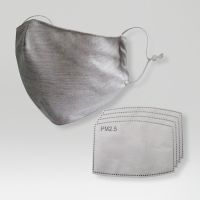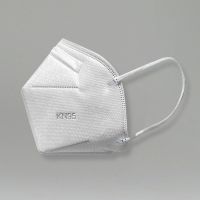This is a demo store. No orders will be fulfilled.
Call Our Herbalists
Herbal Consultations
Disposable KN95 Filters for Face Mask (2 pack)
- Protects against gases, odor, pollen, haze, dust, smoke or any particulate matter with diameter of 0.1 micron or bigger
- Meets or exceeds the US NIOSH N95 filtration standard
- Until our next shipment comes in, there is a maximum limit of 6 packs per customer
Product Description
These PM2.5/KN95 filters meet or exceed the US NIOSH KN95 filtration standard, meaning they can filter out particulate matters that are 0.1 micron(one millionth of a meter) in diameter or bigger by at least 95%.
KN95 is the standard used by FDA in medical PPE (Personal Protection Equipment) to protect medical workers against the virus. However, our masks/filters are not approved by FDA and therefore cannot be used in a medical setting. (Medical device registration required)
According to New York State Department of Health:
“PM2.5 refers to tiny particles or droplets in the air that are two and one half microns or less in width. Particles in the PM2.5 size range are able to travel deeply into the respiratory tract, reaching the lungs. Exposure to fine particles can cause short-term health effects such as eye, nose, throat and lung irritation, coughing, sneezing, runny nose and shortness of breath. Exposure to fine particles can also affect lung function and worsen medical conditions such as asthma and heart disease. Scientific studies have linked increases in daily PM2.5 exposure with increased respiratory and cardiovascular hospital admissions, emergency department visits and deaths. Studies also suggest that long term exposure to fine particulate matter may be associated with increased rates of chronic bronchitis, reduced lung function and increased mortality from lung cancer and heart disease. People with breathing and heart problems, children and the elderly may be particularly sensitive to PM2.5.”
---https://www.health.ny.gov/environmental/indoors/air/pmq_a.htm
PM2.5 comes primarily from automobile exhaust, off-road vehicle (e.g. construction equipment, snowmobile) exhaust and other operations that involve the burning of fuels such as wood, heating oil, coal and natural sources such as forest and grass fires. Indoor sources of PM2.5 are tobacco smoke, cooking (e.g., frying, sautéing, and broiling), burning candles or oil lamps, and operating fireplaces and fuel-burning space heaters (e.g., kerosene heaters).
Each filter can be used anywhere between 1 day to 1 week, depending upon exposure, environment and usage. If supply is ample, replace the filter after 24 hours of active usage. Due to the limited supply, we recommend using it longer, especially when the environment is not polluted (dusty).
Coronavirus is heat sensitive. It deactivates at 133 degrees Fahrenheit after 30 minutes. The filters can be boiled in water for 5-10 minutes for sterilization, then air dried. We do not recommend oven baking the filters as they tend to melt in the oven. Most treatments of the filters will reduce their original filtration efficiency. You may also “quarantine” the filters for 7 days before reusing them as Coronavirus does not survive on most surfaces beyond 2-3 days. Only reuse the filters a few times, if necessary.
The best way to avoid getting sick is to stay at home. If you must go out, face masks in general are an important, though imperfect, option.







